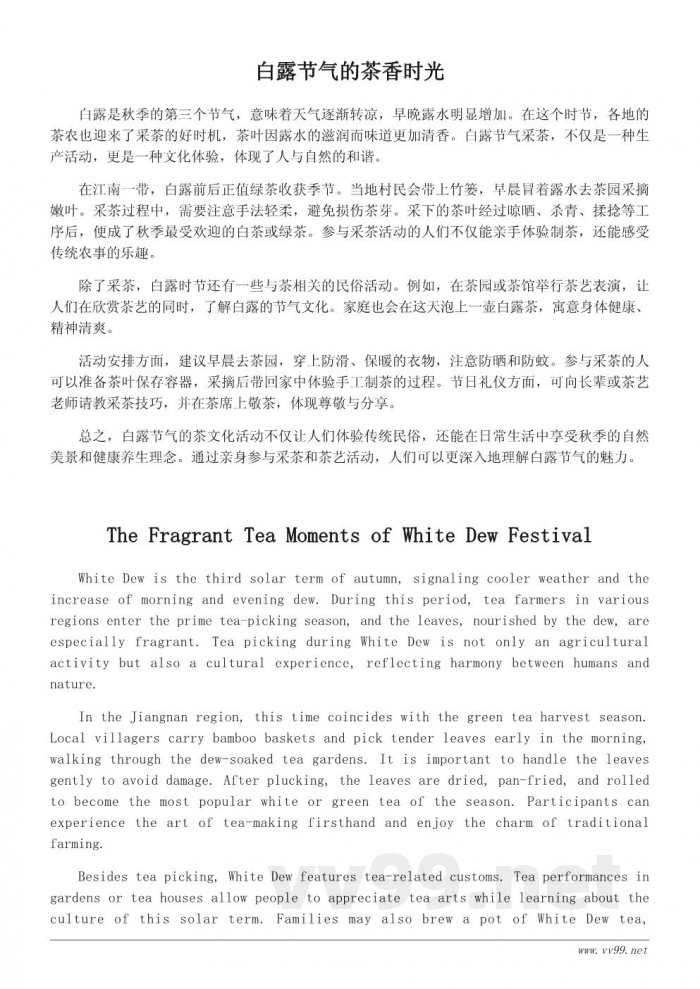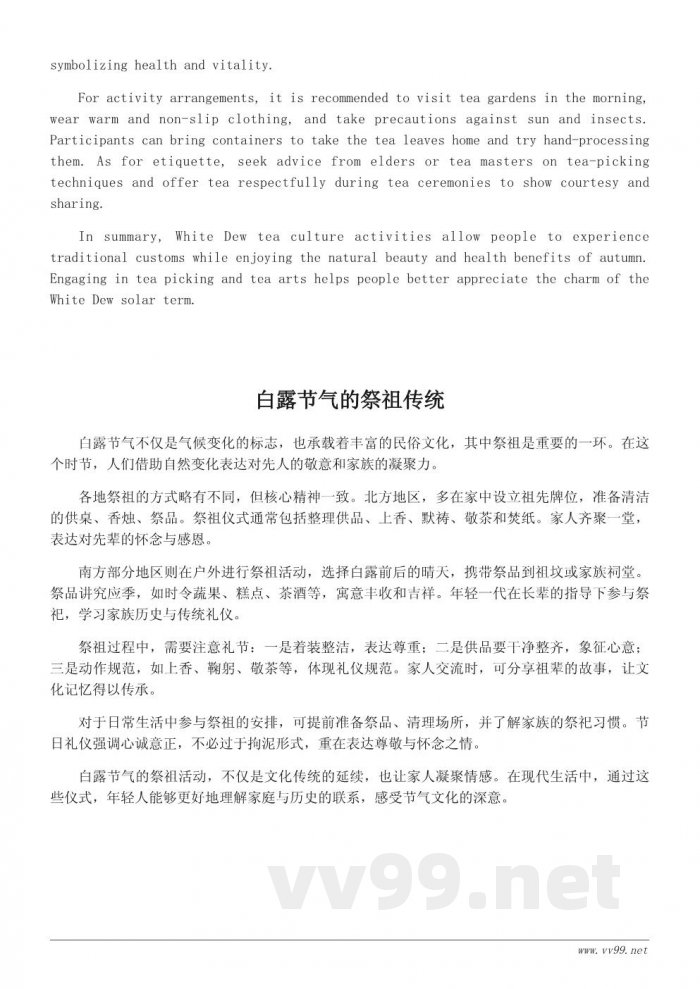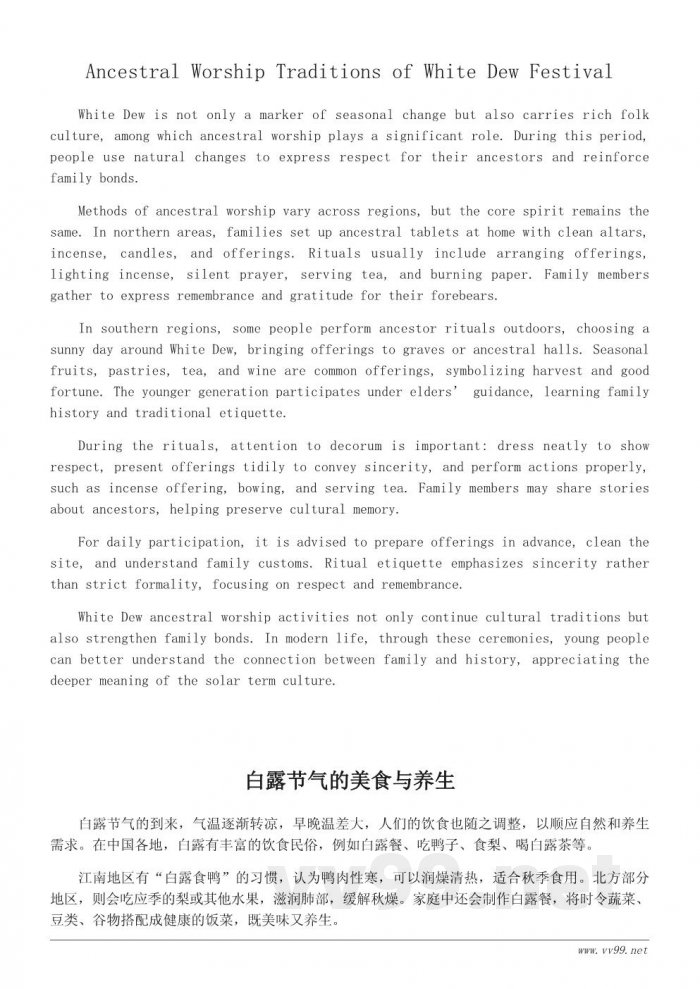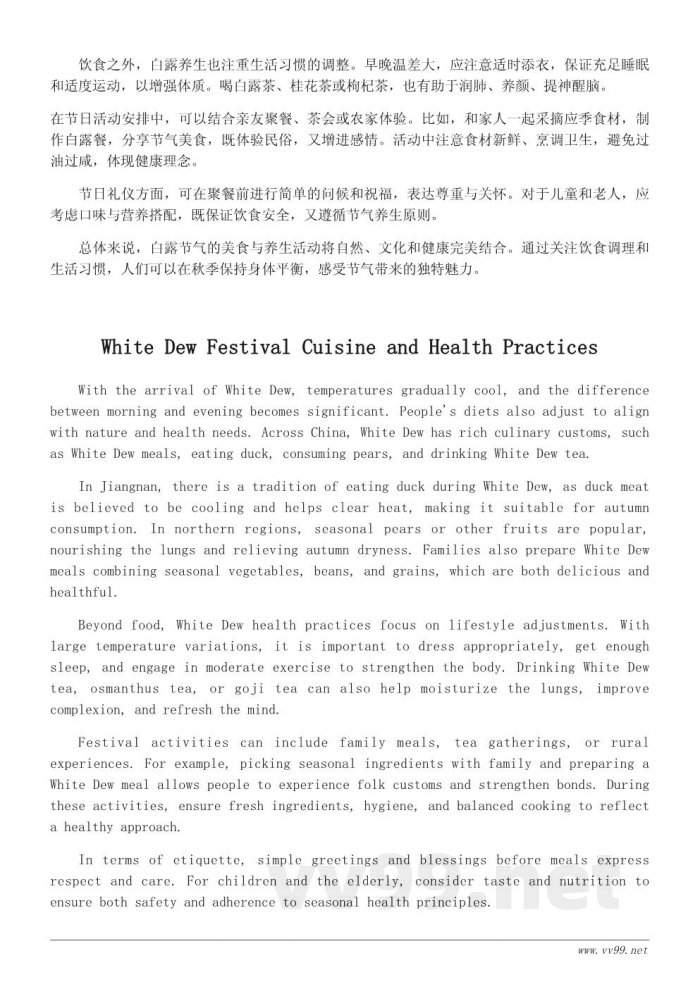白露节气的茶香时光
白露是秋季的第三个节气,意味着天气逐渐转凉,早晚露水明显增加。在这个时节,各地的茶农也迎来了采茶的好时机,茶叶因露水的滋润而味道更加清香。白露节气采茶,不仅是一种生产活动,更是一种文化体验,体现了人与自然的和谐。
在江南一带,白露前后正值绿茶收获季节。当地村民会带上竹篓,早晨冒着露水去茶园采摘嫩叶。采茶过程中,需要注意手法轻柔,避免损伤茶芽。采下的茶叶经过晾晒、杀青、揉捻等工序后,便成了秋季最受欢迎的白茶或绿茶。参与采茶活动的人们不仅能亲手体验制茶,还能感受传统农事的乐趣。
除了采茶,白露时节还有一些与茶相关的民俗活动。例如,在茶园或茶馆举行茶艺表演,让人们在欣赏茶艺的同时,了解白露的节气文化。家庭也会在这天泡上一壶白露茶,寓意身体健康、精神清爽。
活动安排方面,建议早晨去茶园,穿上防滑、保暖的衣物,注意防晒和防蚊。参与采茶的人可以准备茶叶保存容器,采摘后带回家中体验手工制茶的过程。节日礼仪方面,可向长辈或茶艺老师请教采茶技巧,并在茶席上敬茶,体现尊敬与分享。
总之,白露节气的茶文化活动不仅让人们体验传统民俗,还能在日常生活中享受秋季的自然美景和健康养生理念。通过亲身参与采茶和茶艺活动,人们可以更深入地理解白露节气的魅力。
The Fragrant Tea Moments of White Dew Festival
White Dew is the third solar term of autumn, signaling cooler weather and the increase of morning and evening dew. During this period, tea farmers in various regions enter the prime tea-picking season, and the leaves, nourished by the dew, are especially fragrant. Tea picking during White Dew is not only an agricultural activity but also a cultural experience, reflecting harmony between humans and nature.
In the Jiangnan region, this time coincides with the green tea harvest season. Local villagers carry bamboo baskets and pick tender leaves early in the morning, walking through the dew-soaked tea gardens. It is important to handle the leaves gently to avoid damage. After plucking, the leaves are dried, pan-fried, and rolled to become the most popular white or green tea of the season. Participants can experience the art of tea-making firsthand and enjoy the charm of traditional farming.
Besides tea picking, White Dew features tea-related customs. Tea performances in gardens or tea houses allow people to appreciate tea arts while learning about the culture of this solar term. Families may also brew a pot of White Dew tea, symbolizing health and vitality.
For activity arrangements, it is recommended to visit tea gardens in the morning, wear warm and non-slip clothing, and take precautions against sun and insects. Participants can bring containers to take the tea leaves home and try hand-processing them. As for etiquette, seek advice from elders or tea masters on tea-picking techniques and offer tea respectfully during tea ceremonies to show courtesy and sharing.
In summary, White Dew tea culture activities allow people to experience traditional customs while enjoying the natural beauty and health benefits of autumn. Engaging in tea picking and tea arts helps people better appreciate the charm of the White Dew solar term.
白露节气的祭祖传统
白露节气不仅是气候变化的标志,也承载着丰富的民俗文化,其中祭祖是重要的一环。在这个时节,人们借助自然变化表达对先人的敬意和家族的凝聚力。
各地祭祖的方式略有不同,但核心精神一致。北方地区,多在家中设立祖先牌位,准备清洁的供桌、香烛、祭品。祭祖仪式通常包括整理供品、上香、默祷、敬茶和焚纸。家人齐聚一堂,表达对先辈的怀念与感恩。
南方部分地区则在户外进行祭祖活动,选择白露前后的晴天,携带祭品到祖坟或家族祠堂。祭品讲究应季,如时令蔬果、糕点、茶酒等,寓意丰收和吉祥。年轻一代在长辈的指导下参与祭祀,学习家族历史与传统礼仪。
祭祖过程中,需要注意礼节:一是着装整洁,表达尊重;二是供品要干净整齐,象征心意;三是动作规范,如上香、鞠躬、敬茶等,体现礼仪规范。家人交流时,可分享祖辈的故事,让文化记忆得以传承。
对于日常生活中参与祭祖的安排,可提前准备祭品、清理场所,并了解家族的祭祀习惯。节日礼仪强调心诚意正,不必过于拘泥形式,重在表达尊敬与怀念之情。
白露节气的祭祖活动,不仅是文化传统的延续,也让家人凝聚情感。在现代生活中,通过这些仪式,年轻人能够更好地理解家庭与历史的联系,感受节气文化的深意。
Ancestral Worship Traditions of White Dew Festival
White Dew is not only a marker of seasonal change but also carries rich folk culture, among which ancestral worship plays a significant role. During this period, people use natural changes to express respect for their ancestors and reinforce family bonds.
Methods of ancestral worship vary across regions, but the core spirit remains the same. In northern areas, families set up ancestral tablets at home with clean altars, incense, candles, and offerings. Rituals usually include arranging offerings, lighting incense, silent prayer, serving tea, and burning paper. Family members gather to express remembrance and gratitude for their forebears.
In southern regions, some people perform ancestor rituals outdoors, choosing a sunny day around White Dew, bringing offerings to graves or ancestral halls. Seasonal fruits, pastries, tea, and wine are common offerings, symbolizing harvest and good fortune. The younger generation participates under elders’ guidance, learning family history and traditional etiquette.
During the rituals, attention to decorum is important: dress neatly to show respect, present offerings tidily to convey sincerity, and perform actions properly, such as incense offering, bowing, and serving tea. Family members may share stories about ancestors, helping preserve cultural memory.
For daily participation, it is advised to prepare offerings in advance, clean the site, and understand family customs. Ritual etiquette emphasizes sincerity rather than strict formality, focusing on respect and remembrance.
White Dew ancestral worship activities not only continue cultural traditions but also strengthen family bonds. In modern life, through these ceremonies, young people can better understand the connection between family and history, appreciating the deeper meaning of the solar term culture.
小提示:上面此文档内容仅展示完整文档里的部分内容, 若需要下载完整文档请 点击免费下载完整文档 。





